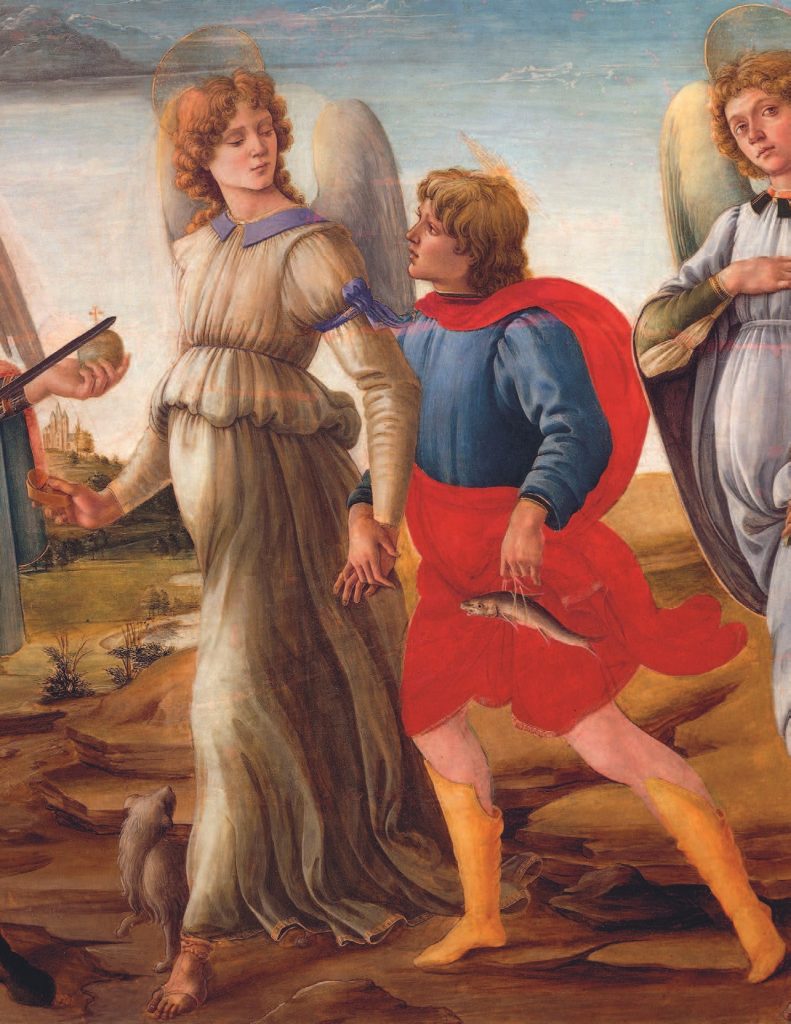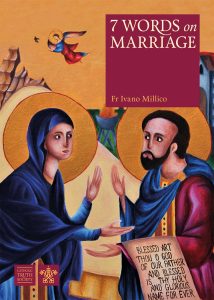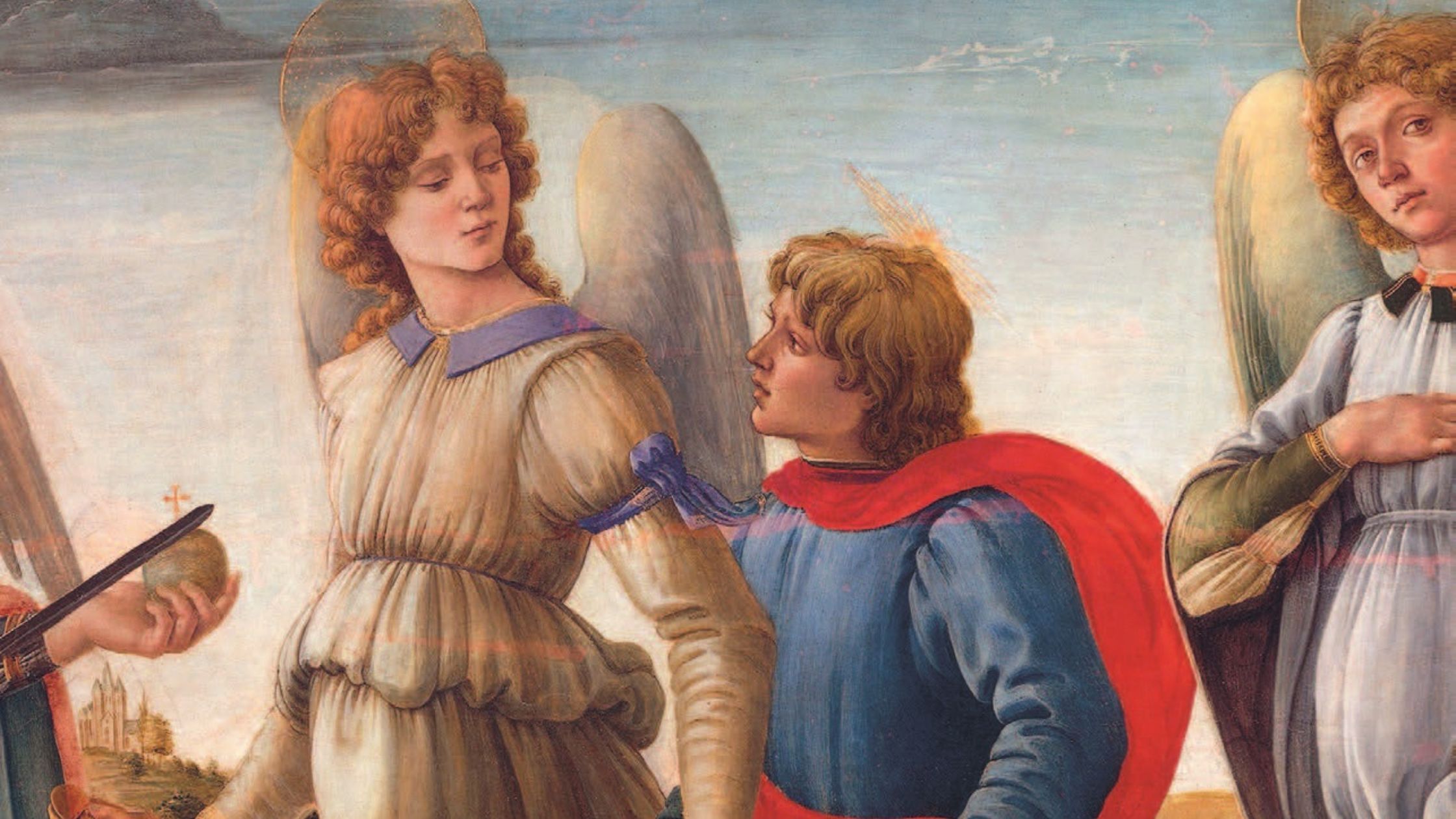“Accompaniment, Discernment and Providence”
Where does your husband come from? Where does your wife-to-be come from? Heaven! Yes indeed, from heaven.
Often, as a priest hearing confessions, I find myself repeating this fundamental truth about marriage over and over again: “it is Heaven that has decided” (Tb 7:12).
Accompaniment
The Bible is full of stories of families and married couples. Among them, one stands out. The Book of Tobit, a second-century BC work, tells the story of Tobias and Sarah. The two will eventually fall in love and get married, but to begin with, live afar from each other, do not even know each other, and are both going through a time of darkness and great sorrow. Tobias is the only son of Tobit and Anna, a devout Jewish couple who during the difficult days of the Babylonian exile keep doing good works. Yet, a series of misfortunes befalls them, bringing this upright family into destitution, and forcing the young Tobias to travel to Media in the hope of regaining some money. There lives Sarah, an only daughter, whose drama evolves around her attempts at marriage. Seven times she had married, and each time, on the wedding night, her husband-to-be has died before having consummated the marriage, through the intervention of a terrible demon.
Tobias and Sarah are living two parallel situations at the limits of despair – having lost all hope, feeling utterly abandoned, ready to prefer death to life. Out of their “existential underworld of suffering” – as Pope Francis has called it – comes a prayer of lament and the answer of God, who sends the Archangel Raphael to become the unsuspecting Tobias’s travelling companion. The rest of the Book tells of how along the journey Raphael – meaning ‘God’s healing’ – instructs Tobias on how to fight the demon, leads him to Sarah’s house, helps him to overcome his fears and even arranges their wedding!
The central core of the whole Book is all about Tobias’s journey from Nineveh to Ecbatana. This is not a literary technique or an interlude between a sad opening and the happy ending. No; the journey is in fact a precious time when God is at work and his plan of love slowly unfolds. Tobias is on his way to the region of Media simply to collect money deposited there and now necessary for his destitute family. In his mind, there is no other reason, no other plan.
And yet, slowly, slowly, along the journey, Raphael begins a dialogue with Tobias, inviting him to open his heart to a different plan, a greater plan, God’s plan. On the lips of this angel we find words like “listen, brother” (Tb 6:12, 13, 16), “I promise you” (Tb 6:13, 16). And so, in the course of the journey Tobias becomes obedient and grows into becoming a disciple; following the angel, he is initiated into the will of God so to embrace it with all his freedom.
The mission of this “good angel” (Tb 5:22), as a distinctive character of the Book, is to reveal the divine loving plan of God for this man and this woman, and to help them to enter into God’s plan. At the outset of his journey, Tobias will find this angel “ready”, “standing facing him” (Tb 5:4), which literally means ‘ahead of him’. What this means is that the plan of God is ahead of this couple, and the work of this good angel is to ‘catechise’ the couple, making them grow in faith, and so help them to respond to the plan of God for their lives.
Discernment
This beautiful biblical story carries a real theology of marriage, captured in two expressions, one by the Archangel Raphael and the other by Sarah’s father, Raguel. Familiar with Sarah’s drama, Tobias is afraid of even considering marrying her: “I do not wish to die”, he says (Tb 6:15). In face of this fear of death, the angel replies: “Do not be afraid: she was destined to you from eternity, and you will save her.
“She will follow you, and I promise my word she will give you children” (Tb 6:18). The angel is announcing to Tobias the ‘plan of God’ for his life, a plan of life not of death, a plan of love and salvation. “And when Tobias heard Raphael say this…he fell so deeply in love with her that he could no longer call his heart his own” (Tb 6:19). Is Tobias falling in love with a girl he has never seen before? A girl renowned for her cursed past marriages? A girl whose marital bed is simply a grave? No. Tobias has been initiated by the angel – an image of the Church who accompanies engaged couples and married couples along their journey – into the will of God for his life. Listening to the angel, Tobias is enlightened, and so ‘falls deeply in love’ with this plan of God. Thanks to the words and the advice of the angel, this young man has learned to pass from fear to trust and to enter into God’s plan deeply, with his whole self. Man discerns and consents to the divine plan, discovers, accepts and wants what God wants, and so finds in this consent, even before the fulfilment of the actual plan of God, rest and deep joy.
The other expression which speaks of God’s plan for marriage is found on the lips of Sarah’s father, Raguel. He is the one who presides over the wedding (see Tb 7). Before entrusting his only daughter to Tobias as his wife and sitting down at the wedding banquet, Raguel reveals not only the truth about her past failed marriages, but the deeper truth about this wedding: “It is heaven that has decided she shall be yours… So, receive her…she is given to you from today for ever” (Tb 7:12). Fully conscious of the death threatening them, Raguel announces: “The Lord will provide for you” (Tb 7:11), a Hebrew expression which means ‘the Lord will act with you…will intervene in your histories…will lead your lives’.
What the Book of Tobit is telling us is that it is only on the strength of these words that the wedding is celebrated and Tobias and Sarah get married. Without the Archangel Raphael and without Raguel there would be no marriage! These two characters represent ‘the Church’ – Raphael, the voice of the catechist–travelling companion, and Raguel, the voice of the father–priest. Marriage is the fruit of a loving encounter, yes, but also the fruit of a spiritual accompaniment because it is a vocation. Pope Francis, addressing the Salesians, experts on the pedagogy of vocation, warns them: “The vocational geography has changed and is changing and this means a new demanding formation where accompaniment and discernment are needed.” Accompaniment and discernment are nothing else but Raphael and Raguel in the “vocational geography” of the story of Tobias and Sarah.
Providence
It is Heaven that has decided she shall be yours… (see Tb 7:12). It is not Tobias who has chosen Sarah first, it is not him who wants her first; God has chosen for him. The Book of Tobit is really important, because here, marriage is really a sacrament, the sign of a presence, the living presence of God who realises a plan of love and salvation. Out of this marriage that was destined only for death comes life and healing, for the couple and far beyond them. Marriage is not a private affair; before being the fruit of a personal choice by man and woman, it is willed by God for the joy of the spouses and for the healing of the people around them.11
According to Jewish tradition – and our Christian faith – every marriage celebrated on earth has been ‘made’ in heaven. There is no union between spouses not wanted by God. Every match responds to a divine will, to a precise divine plan – even when it looks completely random or fortuitous. In marriage a mystery is realised: before a man chooses his wife, before a woman chooses her husband, someone else has already chosen for them. Their choice is but obedience to a divine will, a free response to the secret action of God who helps us to fulfil the design he has prepared for us from all eternity. How beautiful it is and how comforting it is to know that greater than any of our wills, and more ancient than any of our thoughts, is the will of God for us (for you)!
When you look at your wife’s face, when you see your husband, you are in front of the love of God for you. He ‘comes’ from heaven…she ‘comes’ from heaven…from God for you. It is Heaven that has decided…
Yes, heaven has decided, but have you met Raphael and Raguel? Do you know who they are in your “vocational geography”? Do you have catechists, a spiritual director, or an older married couple helping you in your steps towards marriage and after?
Before every couple gets married, they need to be helped and accompanied in their discernment. Once married, this journey needs to continue. They need Raphael and Raguel in order to hear these truths and these promises: the Lord is the Lord of their histories; he is the one who has brought their lives together; he will provide for them, healing their sufferings and transforming sorrow into blessings.
The detail from the painting of Filippo Lippi depicted below shows hand in hand not Tobias and Sarah, but Tobias and the Archangel Raphael. Earth and heaven are hand in hand: heaven is leading this young man to meet his wife-to-be. They are together, they are walking together, but heaven is ahead, heaven has decided, and man slowly and freely discerns, enters the plan of God and discovers the providence of God.

Discover the faithful presence of God in the life-journey of every married couple
 This blog was extracted from our book 7 Words on Marriage
This blog was extracted from our book 7 Words on Marriage
Raphael. I take thee. Ring. Blessing. Nuptial bed. Cana. Sunem.
These are seven life-giving words on your marriage and to your marriage, as it is here and now, whether you took your vows decades ago, are newly-wed, or even still preparing for your wedding day. Drawing from the marriage vows, from stories of couples in Sacred Scripture, and from the practical and inspirational insights of Pope Francis and Pope St John Paul II, we can discover the faithful presence of our loving God in the life-journey of every married couple.
Every marriage is different, yet the same: joys and sorrows, blessings and failures.
These seven words reveal marriage as a sign of hope: an assurance that we can still have faith in marriage, the most beautiful thing God has created.
